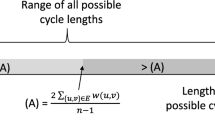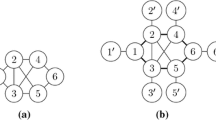Abstract
The problem of finding a fundamental cycle basis with minimum total cost in a graph is NP-hard. Since fundamental cycle bases correspond to spanning trees, we propose new heuristics (local search and metaheuristics) in which edge swaps are iteratively applied to a current spanning tree. Structural properties that make the heuristics efficient are established. We also present a mixed integer programming formulation of the problem whose linear relaxation yields tighter lower bounds than known formulations. Computational results obtained with our algorithms are compared with those from existing constructive heuristics on several types of graphs.
Access this chapter
Tax calculation will be finalised at checkout
Purchases are for personal use only
Preview
Unable to display preview. Download preview PDF.
Similar content being viewed by others
References
Sysło, M.: On some problems related to fundamental cycle sets of a graph. In: Chartrand, R. (ed.) Theory of Applications of Graphs, pp. 577–588. Wiley, Chichester (1981)
Kirchhoff, G.: Über die auflösung der gleichungen, auf welche man bei der untersuchungen der linearen verteilung galvanisher ströme geführt wird. Poggendorf Annalen Physik 72, 497–508 (1847)
Sysło, M.: On cycle bases of a graph. Networks 9, 123–132 (1979)
Sysło, M.: On the fundamental cycle set graph. IEEE Transactions on Circuits and Systems 29, 136–138 (1982)
Horton, J.: A polynomial-time algorithm to find the shortest cycle basis of a graph. SIAM Journal of Computing 16, 358–366 (1987)
Amaldi, E., Rizzi, R.: Personal communication (2003)
Deo, N., Prabhu, G., Krishnamoorthy, M.: Algorithms for generating fundamental cycles in a graph. ACM Transactions on Mathematical Software 8, 26–42 (1982)
Galbiati, G., Amaldi, E.: On the approximability of the minimum fundamental cycle basis problem. In: Solis-Oba, R., Jansen, K. (eds.) WAOA 2003. LNCS, vol. 2909, pp. 151–164. Springer, Heidelberg (2004)
Brambilla, A., Premoli, A.: Rigorous event-driven (RED) analysis of large-scale nonlinear RC circuits. IEEE Transactions on Circuits and Systems–I: Fundamental Theory and Applications 48, 938–946 (2001)
Liebchen, C., Möhring, R.H.: A case study in periodic timetabling. In: Wagner, D. (ed.) Electronic Notes in Theoretical Computer Science, vol. 66, Elsevier, Amsterdam (2002)
Deo, N., Kumar, N., Parsons, J.: Minimum-length fundamental-cycle set problem: New heuristics and an empirical investigation. Congressus Numerantium 107, 141–154 (1995)
Paton, K.: An algorithm for finding a fundamental set of cycles of a graph. Communications of the ACM 12, 514–518 (1969)
Shioura, A., Tamura, A., Uno, T.: An optimal algorithm for scanning all spanning trees of undirected graphs. SIAM Journal of Computing 26, 678–692 (1997)
Hansen, P., Mladenović, N.: Variable neighbourhood search. In: Glover, F., Kochenberger, G. (eds.) Handbook of Metaheuristics, Kluwer, Dordrecht (2003)
Hertz, A., Taillard, E., de Werra, D.: Tabu search. In: Aarts, E., Lenstra, J. (eds.) Local Search in Combinatorial Optimization, pp. 121–136. Wiley, Chichester (1997)
Liberti, L., Amaldi, E., Maculan, N., Maffioli, F.: Mathematical models and a constructive heuristic for finding minimum fundamental cycle bases. Submitted to Yugoslav Journal of Operations Research (2003)
Serafini, P., Ukovich, W.: A mathematical model for periodic scheduling problems. SIAM Journal of Discrete Mathematics 2, 550–581 (1989)
Author information
Authors and Affiliations
Editor information
Editors and Affiliations
Rights and permissions
Copyright information
© 2004 Springer-Verlag Berlin Heidelberg
About this paper
Cite this paper
Amaldi, E., Liberti, L., Maculan, N., Maffioli, F. (2004). Efficient Edge-Swapping Heuristics for Finding Minimum Fundamental Cycle Bases. In: Ribeiro, C.C., Martins, S.L. (eds) Experimental and Efficient Algorithms. WEA 2004. Lecture Notes in Computer Science, vol 3059. Springer, Berlin, Heidelberg. https://doi.org/10.1007/978-3-540-24838-5_2
Download citation
DOI: https://doi.org/10.1007/978-3-540-24838-5_2
Publisher Name: Springer, Berlin, Heidelberg
Print ISBN: 978-3-540-22067-1
Online ISBN: 978-3-540-24838-5
eBook Packages: Springer Book Archive




